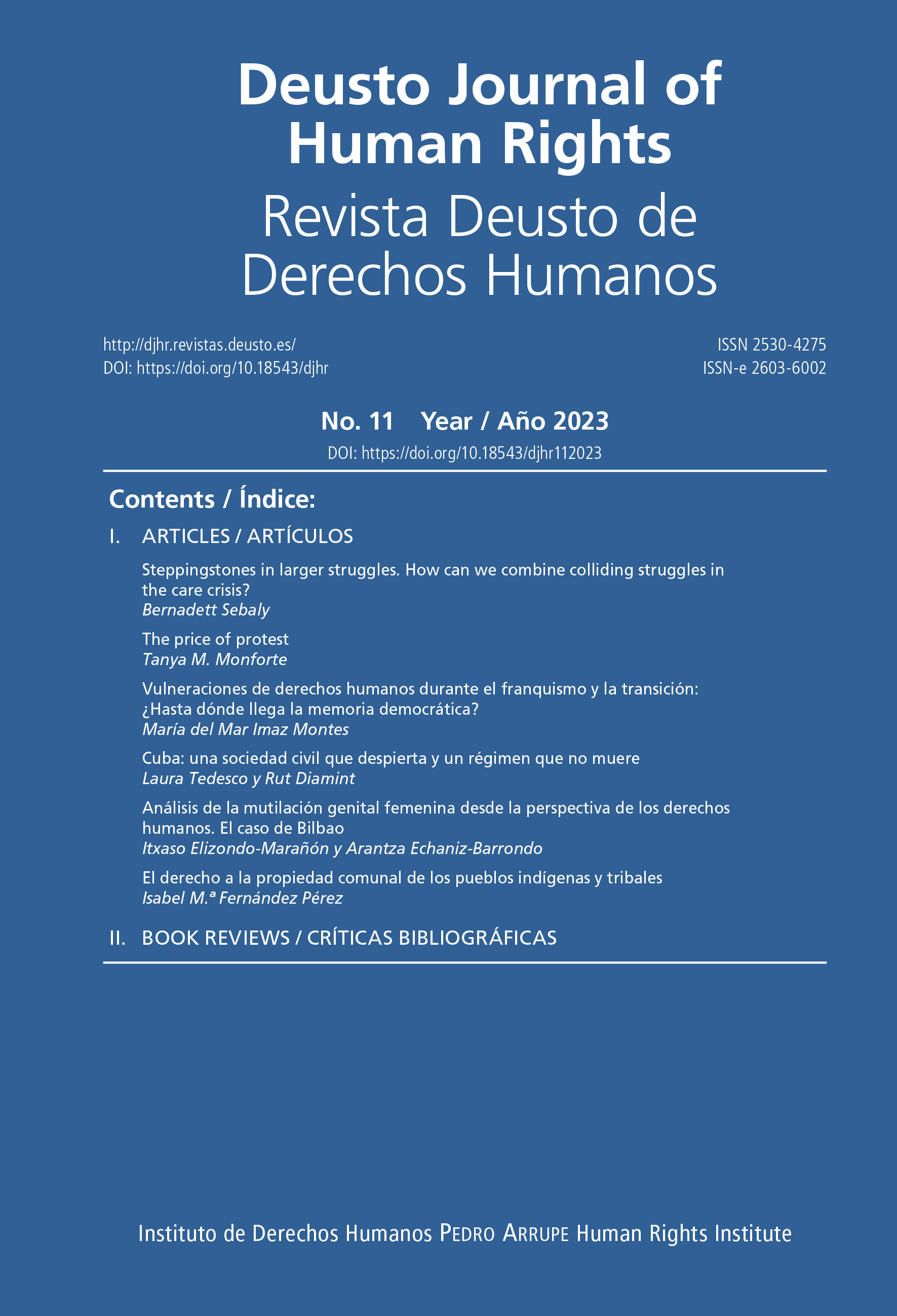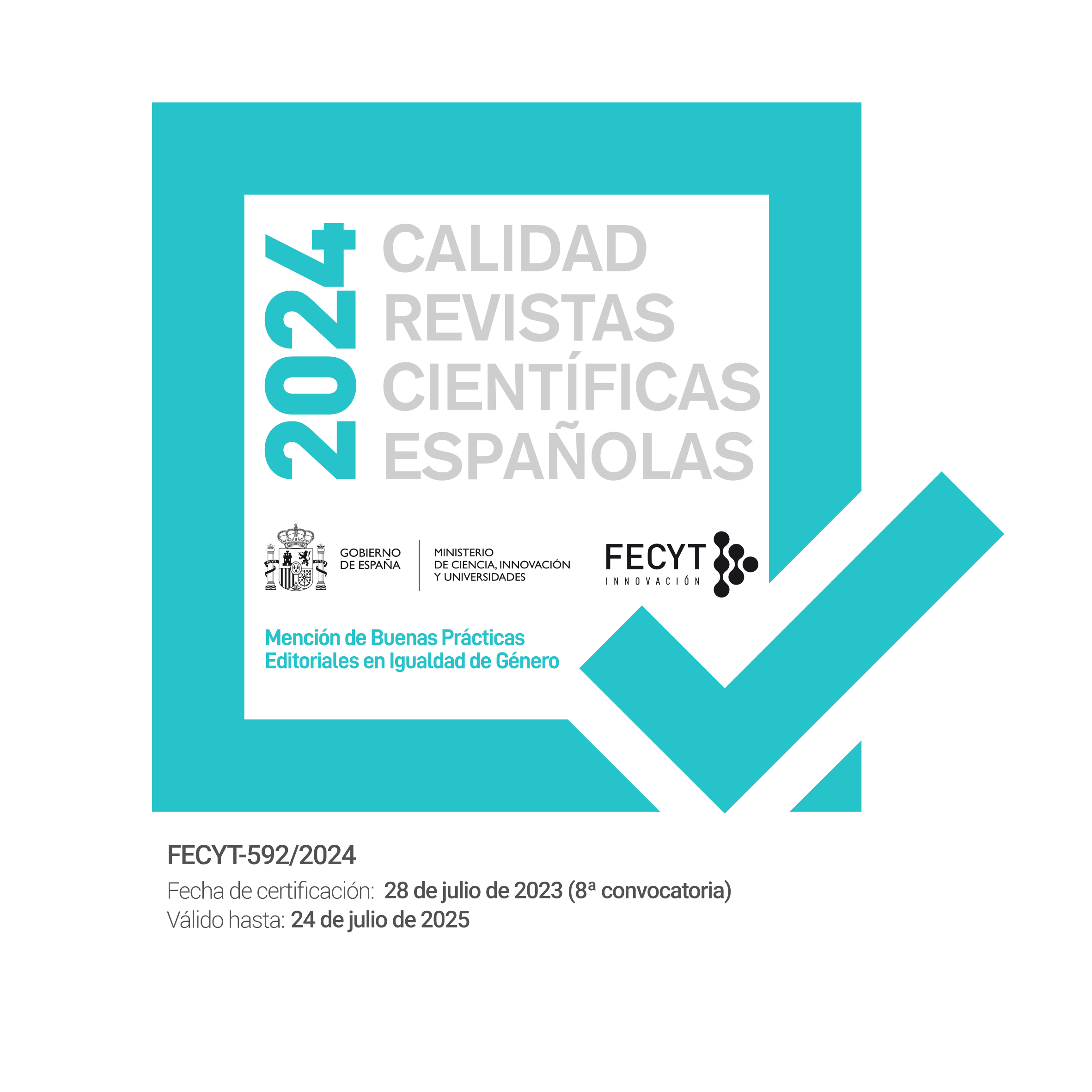Puntos de apoyo en luchas más amplias. ¿Cómo podemos combinar las luchas que colisionan en la crisis de los cuidados?
Resumen
La cuestión del aumento de la prestación para personas cuidadoras es un tema controvertido entre los expertos en políticas y los actores del movimiento. Se critica que es contraproducente para la emancipación de las personas con discapacidad y de las mujeres. Al mismo tiempo, se convierte en el objetivo de las campañas de las organizaciones, ya que proporciona una solución inmediata, en particular, a las familias con bajos ingresos. Esto pone de manifiesto dos cuestiones: 1. ¿Cómo pueden los activistas luchar por resultados transformadores a gran escala y conseguir cambios reales y tangibles en la vida de las personas? 2. ¿Cómo puede un colectivo luchar por su liberación sin dejar atrás a otros colectivos? Basándome en el análisis de la lucha de los cuidadores húngaros, propongo una resolución emancipadora a estas dos cuestiones. Sugiero que se consideren las luchas de los grupos afectados como diferentes dimensiones de la crisis de los cuidados y propongo un marco organizativo que se comprometa con los profundos fundamentos estructurales del capitalismo y tome en serio las cuestiones del poder y control inherentes a las relaciones de cuidados.
Recibido: 05 julio 2022
Aprobado: 05 diciembre 2022
Publicación en línea: Artículos en Prensa, febrero 2023
Descargas
Citas
Act III of 1993 on social administration and social benefits. 1993. Accessed November 16, 2022. https://ec.europa.eu/migrant-integration/library-document/act-iii-1993-social-governance-and-social-benefits_en
aHang. 2018. «Az otthonápolás munka, amelyért munkabér jár!» Petition. May. Accessed June 14, 2019. https://terjed.ahang.hu/campaigns/apolasidij
Andrews, Kenneth T. 2001. «Social movements and policy implementation: The Mississippi civil rights movement and the war on poverty, 1965 to 1971.» American Sociological Review 66 (1): 71–95. https://doi.org/10.2307/2657394.
AOSZ. 2019. Érdekvédelmi napló. May 9. Accessed June 14, 2019. https://aosz.hu/erdekvedelmi-naplo/.
Arruzza, Cinzia, Nancy Fraser, and Tithi Bhattacharya. 2019. Feminism for the 99%: A Manifesto. New York: Verso Books.
Barry, Jackie. 1995. «Care Need and Care Receivers. Views From the Margins.» Women’s Studies International Forum 18 (3): 361–74.
Bass, László (ed). 2009. Jelentés a súlyosan-halmozott fogyatékos embereket nevelő családok életkörülményeiről. Budapest: Kézenfogva Alapítvány.
Betlen, Anna. 2018. Minimálbért az otthonápolásért? Egy lépés előre, egy évszázad hátra. November 18. Accessed July 4, 2022. https://merce.hu/2018/11/18/minimalbert-az-otthonapolasert-egy-lepes-elore-egy-evszazad-hatra/
Brown, Wendy. 2019. In the ruins of neoliberalism. The rise of antidemocratic politics in the west. New York: Columbia University Press.
Chmelík, Maroš, Steve Hughes, Wioleta Hutniczak, Alexandru Palas, Marija Peric, Bernadett Sebály and Gáspár Bendegúz Tikász. 2021. The power of organizing. stories of community organizing campaigns from across Europe. Accessed July 4, 2022. https://organizeeurope.org/wp-content/uploads/2021/12/Power-of-Organizing-FINAL-English.pdf.
Cornwall, Andrea, and Vera Schattan P. Coelho. 2007. Spaces for change? The politics of citizen participation in new democratic arenas. London: Zed Books.
Dagnino, Evelina. 2011. «Civil society in Latin America.» In The Oxford Handbook of Civil Society, edited by Michael Edwards, 122–33. New York: Oxford University Press.
Esztári, Erzsébet and Márkus Eszter. 2009. «Pillanatfelvétel a súlyosan-halmozottan sérült emberek élethelyzetérõl Magyarországon és az IME-program.» In A súlyos és halmozott fogyatékossággal élő emberek helyzete Magyarországon. Tanulmánykötet. Második rész, edited by György Könczei, 16-22. Budapest: ELTE Bárczi Gusztáv Gyógypedagógiai Kar.
Ferge, Zsuzsa. 1998. «Szociális törvénykezés a rendszerváltás óta.» Esély 3: 3-23.
Finch, Janet. 1983. «Community care: Developing non-sexist alternatives.» Critical Social Policy 3 (9): 6–18.
Finch, Janet, and Dulcie Groves. 1980. «Community care and the Family: A case for equal opportunities?» Journal of Social Policy 9 (4): 487-511.
Fisher, Berenice, and Joan Tronto. 1990. «Towards a feminist theory of caring.» In Circles of care. Work and identity in women’s lives, edited by Emily K. Abel and Margaret K. Nelson, 35–62. SUNY Series on Women and Work. Albany, NY: SUNY Press.
Fraser, Nancy. 1994. «After the family wage: gender equity and the welfare state.» Political Theory 22 (4): 591–618.
Fraser, Nancy. 2013. «A triple movement?» New Left Review 81: 119–32.
Fraser, Nancy. 2016. «Contradictions of capital and care.» New Left Review 100: 99–117.
Fraser, Nancy. 2022. Cannibal capitalism: How our system is devouring democracy, care, and the Planetand what we can do about it. New York: Verso Books.
Ganz, Marshall. 2004. «Organizing.» In Encyclopedia of Leadership, Volume 3, edited by George R. Goethals, Georgia J. Sorenson and James MacGregor Burns. London: SAGE Publications.
Ganz, Marshall. 2009. Why David sometimes wins: leadership, organization and strategy in the California farm worker movement. New York: Oxford University Press.
Gheaus, Anca. 2020. «The feminist argument against supporting care.» Journal of Practical Ethics 8 (1): 1–27.
Han, Hahrie, Elizabeth McKenna, and Michelle Oyakawa. 2021. Prisms of the people. Power & organizing in twenty-first-century America. Chicago: University of Chicago.
Healey, Richard. 2015. Organizing for governing power. Grassroots policy project. Accessed July 4, 2022. https://funderscommittee.org/wp-content/uploads/2018/06/Healey-Organizing-for-Governing-Power-Dec2015.pdf.
Hull, Akasha Gloria, Patricia Bell-Scott, and Barbara Smith. 1982. All the women are white, all the blacks are men, but some of us are brave. New York: Feminist Press at the City University of New York.
Keith, Lois. 1992. «Who cares wins? Women, caring and disability.» Disability, Handicap & Society 7 (2): 167–75. https://doi.org/10.1080/02674649266780191.
KFIB, Költségvetési Felelősségi Intézet Budapest (Fiscal Responsibility Institute Budapest) and Lépjünk, hogy léphessenek. 2016. A kiemelt ápolási díj. May 12. Accessed June 14, 2019. http://kfib.hu/hu/civilek-a-koltsegvetesrol-2017.
Kovács, Vera (ed). 2018. Önállóan lakni – Közösségben élni. Kutatási beszámoló. Budapest: Közélet Iskolája
Kovács, Vera. 2020. «Fogyatékos emberek lakhatási helyzete – akadálymentesség a fővárosban és azon kívül.» In Éves jelentés a lakhatási szegénységről, edited by Ákos Gosztonyi, 57-68. Budapest: Habitat for Humanity Magyarország.
Kozma, Ágnes, Petri Gábor, and Bernát Anikó. 2020. Kiszolgáltatottság és stagnálás: fogyatékos emberek társadalmi helyzete a 2010-es években. In Társadalmi Riport 2020, edited by Tamás Kolosi, Iván Szelényi, and István György Tóth, 381-403. Budapest: Tárki Zrt.
Koyanagi, Chris. 2007. Learning from history: Deinstitutionalization of people with mental illness as precursor to long-term care reform. Washington, D.C.: Henry J. Kaiser Family Foundation.
Könczei, György (ed). 2009. A súlyos és halmozott fogyatékossággal élő emberek helyzete Magyarországon. Tanulmánykötet. Második rész. Budapest: ELTE Bárczi Gusztáv Gyógypedagógiai Kar.
KSH. 2021a. 20.1.1.69. Minimálbér, közfoglalkoztatotti bérminimum, garantált bérminimum (1992-). Accessed July 1, 2022. https://www.ksh.hu/stadat_files/mun/hu/mun0069.html
KSH. 2021b. 25.1.1.21. Rendszeres szociális támogatások (2000–). Accessed July 1, 2022. https://www.ksh.hu/stadat_files/szo/hu/szo0021.html
Lépjünk, hogy léphessenek. 2019. Kérés a GYOD igénylés igazságtalan szempontrendszerének felülvizsgálatával kapcsolatban. January 23. Accessed June 14, 2019. http://lepjunkhogylephessenek.hu/wp-content/uploads/2019/01/Lev%C3%A9l-F%C3%BCl%C3%B6p-Attila-%C3%A1llamtitk%C3%A1rnak_GYOD.pdf.
Lépjünk, hogy léphessenek (2020). Nyílt levél az otthonápolásról. September 28. Accessed October 1, 2020. https://lepjunkhogylephessenek.hu/2020/09/nyilt-level-az-otthonapolasrol/.
Lister, Ruth. 1990. «Women, economic dependency and citizenship.» Journal of Social Policy 19 (4): 445–67. https://doi.org/10.1017/S0047279400018250.
Márkus, Eszter. 2009. «A súlyosan-halmozottan fogyatékos emberek ellátásának jogi és intézményi háttere.» In A súlyos és halmozott fogyatékossággal élő emberek helyzete Magyarországon. Tanulmánykötet. Második rész., edited by György Könczei, 123-131. Budapest: ELTE Bárczi Gusztáv Gyógypedagógiai Kar.
Mechanic, David, and David A. Rochefort. 1990. «Deinstitutionalization: An appraisal of reform.» Annual Review of Sociology 16: 301–27.
MEOSZ. 2018a. Kiváltás: A MEOSZ ragaszkodik ahhoz, hogy a fogyatékos emberek jogai álljanak a középpontban. November 22. Accessed July 4, 2022. http://www.meosz.hu/blog/kivaltas_a_fogyatekos_emberek_jogai_alljanak_a_kozeppontban/.
MEOSZ. 2018b. Open Letter of MEOSZ to Viktor Orbán. July 7. Accessed June 14, 2019. http://www.meosz.hu/wp-content/uploads/2018/07/apolasi-dij-level-2018.07.07.pdf.
MEOSZ. 2019. «51700 magyar ápolási díjban részesülő család ügye ürügy lett egy politikai és méltatlan csatában!» Open Letter. February 4. Accessed June 14, 2018. http://www.meosz.hu/wp-content/uploads/2019/02/Apolasi-dij-nyilt-level_2019.02.04.1.pdf.
Meyer, David S. 2004. «Protest and political opportunities.» Annual Review of Sociology 30: 125–45.
Mladenov, Teodor. 2015. «Neoliberalism, postsocialism, disability.» Disability & Society 30 (3): 445–59. https://doi.org/10.1080/09687599.2015.1021758.
Mladenov, Teodor, and Gábor Petri. 2020. «Critique of deinstitutionalisation in postsocialist Central and Eastern Europe.» Disability & Society 35 (8): 1203–26. https://doi.org/10.1080/09687599.2019.1680341.
Nicholls, Walter J., Justus Uitermark, and Sander van Haperen. 2000. «Going national: How the fight for immigrant rights became a national social movement.» Journal of Ethnic and Migration Studies 46 (4): 705–27.
Petri, Gábor. 2020. «Financing of care services for persons with disabilities in Hungary.» Fact Sheet. EASPD.
Petri, Gábor. 2021. «Miért Nem Az Értelmi Fogyatékos És/Vagy Autista Emberek Vezetik Az Érdekeiket Képviselő Szervezeteket? - Kutatási Összefoglaló.» In Széttartó Összhang - Fogyatékosságtudomány Magyarországon, edited by Nikolett Rékasi, Anikó Sándor, Borbála Bányai, and Zsuzsa Kondor, 151-170. Budapest: ELTE Bárczi Gusztáv Gyógypedagógiai Kar.
Petri, Gábor, Julie Beadle-Brown, and Jill Bradshaw. 2021. «‘Even a self-advocate needs to buy milk’. Economic barriers to self-advocacy in the autism and intellectual disability movement.» Scandinavian Journal of Disability Research 23 (1): 180–91. https://doi.org/10.16993/sjdr.738.
Sebály, Bernadett. 2020. Social movements and policy change: case study on caregiver benefit policies in Hungary. Central European University. Accessed July 4, 2022. https://www.researchgate.net/publication/352262170_Social_Movements_and_Policy_Change_Case_Study_on_Caregiver_Benefit_Policies_in_Hungary
Segal, Steven P. 1979. «Community care and deinstitutionalization: A review.» Social Work 24 (6): 521–27.
Shorbagy, Manar. 2007. «Understanding Kefaya: The new politics in Egypt.» Arab Studies Quarterly 29 (1): 39–60.
Stall, Susan, and Randy Stoecker. 1998. «Community organizing or organizing community? Gender and the crafts of empowerment.» Gender and Society 12 (6): 729–56.
Szikra, Dorottya (2018). «Ideológia vagy pragmatizmus? Családpolitika az orbáni illiberális demokráciában.» In Lépték és irónia, edited by András Bozóki and Katalin Füzér, 219-240. Budapest: L'Harmattan.
TASZ. 2017. Az állam lemondott a súlyosan-halmozottan fogyatékos gyerekek oktatásáról. July 5. Accessed July 4, 2022. https://tasz.hu/cikkek/az-allam-lemondott-a-sulyosan-halmozottan-fogyatekos-gyerekek-oktatasarol.
TASZ (2019). Szabad napot minden családnak! Accessed August 5, 2020. https://tasz.hu/szabad-napot-minden-csaladnak-onalloan-de-nem-magukra-hagyva
Triantafillou et al (2010). «Informal care in the long-term care system.» European Overview Paper. Accessed June 14, 2019. https://www.euro.centre.org/downloads/detail/768
Verdes, Tamás. 2009. «A ház az intézet tulajdona.» Esély 4: 107.
Verdes, Tamás. 2010. «Állami Taigetosz - A súlyosan, halmozottan fogyatékos tanulók iskolai oktatásáról.» Magyar Narancs 22 (42): 58-59.
Verdes, Tamás, Scharle Ágota, and Váradi Balázs 2012. A fogyatékos személyeket támogató szociálpolitika megújításának lehetséges irányairól. Budapest: Budapest Intézet és Társaság a Szabadságjogokért
Verdes, Tamás. 2014. Az otthoni ápolás zsákutcája I-III. August 19, August 28, November 3. Accessed July 4, 2022. https://ataszjelenti.blog.hu/2014/08/19/mi_a_baj_az_apolasi_dijjal.
Warren, Mark E. 2001. Democracy and association. Princeton, NJ: Princeton University Press.
Whitman, Gordon. 2018. Stand Up! How to get involved, speak out, and win in a world on fire. Oakland, CA: Berrett-Koehler Publishers.
Young, Vicki Lawrence, John S. Wodarski, and Jeffrey Giordano. 1982. «Deinstitutionalization: A review of the literature with implication for social work training and practice in rural areas.» The Journal of Sociology & Social Welfare 9 (4): 641–61.
Deusto Journal of Human Rights / Revista Deusto de Derechos Humanos es una revista de Acceso Abierto; lo que significa que es de libre acceso en su integridad inmediatamente después de la publicación de cada número. Se permite su lectura, la búsqueda, descarga, distribución y reutilización en cualquier tipo de soporte sólo para fines no comerciales y según lo previsto por la ley; sin la previa autorización de la Editorial (Universidad de Deusto) o la persona autora, siempre que la obra original sea debidamente citada (número, año, páginas y DOI si procede) y cualquier cambio en el original esté claramente indicado. Cualquier otro uso de su contenido en cualquier medio o formato, ahora conocido o desarrollado en el futuro, requiere el permiso previo por escrito de la persona titular de los derechos de autoría.



3.jpg)
3.jpg)
3.jpg)
.jpg)








